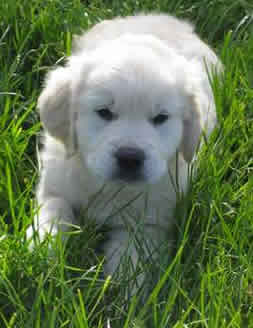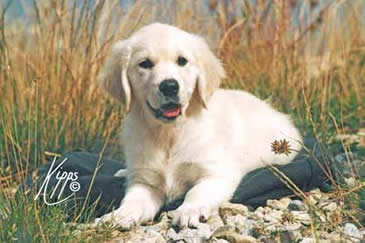Buying a Puppy
Buying a Golden Retriever Puppy should be an enjoyable experience for you and your family; however there are many things that should be considered before you proceed.

Funded by the Golden Retriever Club of Scotland's Welfare and Rescue Trust, the Club advertises extensively in local and national press in an effort to encourage potential buyers to exercise great care in selecting a good breeder, as there are a number of intensive volume breeders who may have little regard or consideration for the basic needs and care of the dogs concerned.
There may be many reasons why you are considering a Golden Retriever, you may be looking for a pet that is good with children, be interested in a dog for showing or working and hopefully the club will be able to guide you through this process.
Before you buy, the Golden Retriever Club of Scotland suggests that you consider why you want a dog.
Remember a Golden Retriever has a life expectancy of anything from 12 to 16 years so this is a long term commitment for yourself and the family.
Here are some questions to ask yourself before you look at any pups.
Is someone around during the day?
A young puppy needs company. Someone "coming in at lunchtime" will never work. He is inquisitive and willing to play and learn. Your flooring and woodwork are in serious danger if someone is not around to use the NO word! He will have to start toilet training right away. This means taking him out when he wakes and after each meal. It will be to your advantage if he is encouraged to use a particular area of garden to do his business. Without attention it will be virtually impossible to toilet train, and a puppy or indeed an older dog will become stressed and destructive if left alone for long periods.
Is your garden secure?
It is so important that your garden has adequate fencing. A young puppy is naturally curious and will explore any hole or gap he can find. Put your mind at rest and have this checked out. Remember some plants and daffodil bulbs are poisonous so make sure that these are out of reach.
Are the children old enough to take on the responsibility of a dog?
Although Golden Retrievers make excellent family pets, and chosen with care from the right breeder, will be happy with young children, the younger members must realise that the puppy is an animal and not a toy. He is a long term commitment and not a whim, so discuss this thoroughly before you go to view a litter. A good breeder will want to meet the whole family and make any suggestions required to help you.
Do you have a good veterinary practice in your area?
Unfortunately the cost of your puppy does not stop after the initial purchase price! Your breeder will probably have had the litter checked by their vet before they leave for their new homes, but will advise you to take him along to your vet to have him checked again shortly after bringing him home. Make contact with your vet before purchasing and ask about their immunisation programme and any other relevant points. Remember a trip to the vet will always cost you money, even if it is just for a yearly check up.
OK, so you've done all that and you still want to go ahead.
Here is some advice that we would strongly recommend you to follow.
Go through a Golden Retriever Breed Club. You should find that you will get some sensible friendly advice on what you should look for when you go to view a litter of puppies.
They will probably be able to give you contact numbers of breeders. Most clubs will have a list of their members who have litters available. The Golden Retriever Club of Scotland will have this available. Contact the Puppy Register for this information.
 A good breeder will always want to meet you before agreeing to sell you a puppy. They should have hip certificates and up to date eye certificates for both sire and dam of the pups. These certificates are issued when the parents have been submitted for the necessary hip x-rays and eye examinations. They are absolutely essential as it is extremely important that the sire and dam of the litter are sound and have no hereditary conditions that could be passed on to their progeny. No responsible breeder would dream of breeding without them being in place. They will be willing to show you these certificates and explain more about the scheme should you require.
A good breeder will always want to meet you before agreeing to sell you a puppy. They should have hip certificates and up to date eye certificates for both sire and dam of the pups. These certificates are issued when the parents have been submitted for the necessary hip x-rays and eye examinations. They are absolutely essential as it is extremely important that the sire and dam of the litter are sound and have no hereditary conditions that could be passed on to their progeny. No responsible breeder would dream of breeding without them being in place. They will be willing to show you these certificates and explain more about the scheme should you require. Always see the mother with her puppies. Never let a breeder bring a puppy to you. You should, if possible, see the whole litter. The mother should be a happy outgoing bitch. The area where the pups are should be clean and well managed. Puppies that have been brought up in a clean environment will be so much easier to toilet train. A five generation pedigree, diet sheet and Kennel Club Registration Certificate should always be given to you when purchasing your puppy.
A good breeder will spend time answering questions. Never think that anything you want to ask will ‘sound daft'. Remember, breeders started from a first puppy themselves so will never think a question is silly and would rather you asked than go away and worry.
They will also give you advice on any particular interests you may have such as showing, working, obedience or agility training.

Most importantly they will help you with advice on socialising. A lot of this will have been attended to long before the puppy leaves the litter. A good breeder will have spent most of the first eight weeks of the puppies' lives down on their knees playing with them. This is so important and establishes the bond between dog and human. Remember dogs are pack animals so have to be taught right away, that people are their friends and part of their world.
Golden Retrievers are wonderful dogs with so much to offer, so enjoy your new puppy.
For further information or advice call our breed representative on 01770 810597


